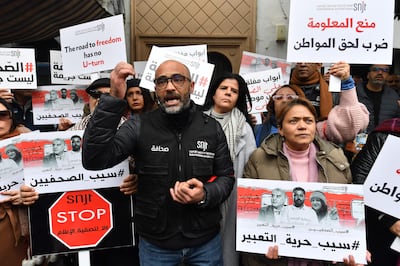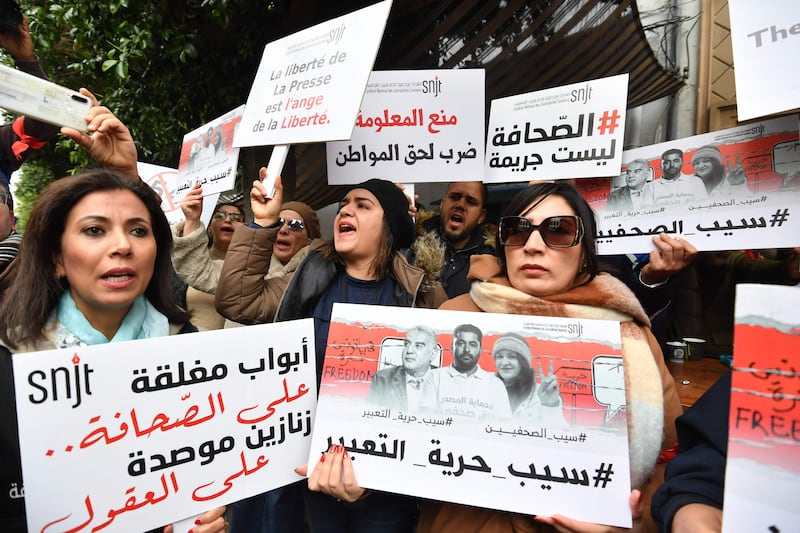A Tunisian judge ordered the release of journalist and media pundit Zied El Heni on Wednesday night with a six-month suspended prison sentence.
Mr El Heni had been in custody since January 1 after making critical comments about the Tunisian minister of commerce, Kalthoum Ben Rejeb, on a radio show.
His comments prompted the Tunis public prosecutor's office to order his arrest and prosecution under a law that punishes “the use of telecommunications networks to harm or insult others”.
In September 2022, Tunisian president Kais Saied issued Decree 54 against spreading information that is deemed false online, with prison sentences of up to 10 years for offenders.
Anyone found to have used information networks to “promote [or] publish … false news” to harm public security and national defence could face a five-year prison sentence and a fine of 50,000 Tunisian dinars ($15,600).
The prison sentence could be doubled to 10 years if the victim is a public official.
Since the binding decree was issued, journalists, politicians and activists have raised concerns about the effect it could have on freedom of expression and freedom of the press.
“On the 13th anniversary of the revolution, authorities are [sending] a message of disdain for this revolution by making us subjects to [ousted president] Ben Ali,” Zied Dabbar, president of the Tunisian Journalists’ National Union (SNJT), told The National in front of Tunis' Court of First Instance before Mr El Heni's release.

Mr Dabbar said that at least seven Tunisian journalists are facing trial, on similar charges, according to the same decree.
“In more than 65 years of independence, we had never imagined that we would reach a point where three Tunisian journalists are behind bars,” Mr Dabbar told The National.
On January 4, the International Federation of Journalists (IFJ) addressed an open letter to the Tunisian President, urging him to exercise his powers as head of state “to uphold the constitution and protect press freedom”.
Two journalists were jailed last year, following the enactment of Decree 54.
Radio reporter Khalifa Guesmi is serving a five-year prison sentence – the heaviest sentence to ever be handed down to a journalist in the country – over allegations that he had jeopardised a security operation after publishing an article using information from an official source.
Meanwhile, Mr Guesmi's source received a 10-year prison sentence.
Another journalist, Shadha Haj Mbarek, has been under pretrial detention since September 2021 for allegedly plotting against the state’s national security, despite the fact that Tunisian law does not allow more than 18 months of pretrial detention even in cases relating to suspected terrorism.
“Today, unfortunately, judicial bodies do not respect freedom as a value and there is a revenge tendency towards journalists,” Mr Dabbar said.
“The building of nations does not occur through the imprisonment of journalists and their humiliation, and certainly not through discriminatory speech and spreading hatred,” he added.







